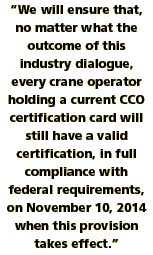An important message from NCCCO President, Thom Sicklesteel
There has been much discussion in the industry recently about the new crane rule (known officially as Subpart CC of 29 CFR 1926) and, in particular, the effect it might have on how  crane operators are certified. Two of the primary issues that have generated most concern seem to be OSHA’s position on certifying “by capacity and type” and the recertification requirements for those operators who are already certified. The National Commission for the Certification of Crane Operators (NCCCO) continues to be at the forefront of these discussions working closely with the industry and regulators alike. We thought it might be helpful, at this time, to share our position on these issues.
crane operators are certified. Two of the primary issues that have generated most concern seem to be OSHA’s position on certifying “by capacity and type” and the recertification requirements for those operators who are already certified. The National Commission for the Certification of Crane Operators (NCCCO) continues to be at the forefront of these discussions working closely with the industry and regulators alike. We thought it might be helpful, at this time, to share our position on these issues.
First, while we respect OSHA’s position and the task the Directorate of Construction has been assigned in implementing the operator certification requirement, the rule requires that certification bodies be accountable to their accrediting agencies to ensure their tests are fair and relevant. While crane capacity is an element that needs to be considered in the development of crane operator certification exams, it is but one of many factors that industry experts consider as they establish the means by which operators’ qualifications are assessed. CCO crane operator certification, which has been continuously accredited since 1998, has received several commendations from ANSI for its test integrity and validity, and was the first certification to be officially recognized by Federal OSHA as meeting national standards for crane operator qualifications.
Simply adding crane capacity to the certification card is easy. In fact, NCCCO did that for many years and is able and willing to do it again. The bigger issue, however, is whether the type of testing that OSHA is proposing will make the industry safer—or at least as safe—as the industry intended when the Cranes and Derrick Committee (C-DAC) wrote the document that formed the basis of this rule over nine years ago. Comments made by former C-DAC members at recent meetings hosted by the Small Business Administration (SBA) and the Specialized Carriers & Rigging Association (SC&RA) seem to make it very clear that what C-DAC wrote, and voted for, was never meant to be construed in the way that OSHA is now proposing.
While NCCCO remains active in the debate, it is clear that the issues may take some time to resolve. These discussions involve OSHA, the Small Business Administration (SBA), major industry organizations, the crane manufacturers, the accrediting bodies (NCCA and ANSI) and, of course, the certification bodies, including NCCCO. These issues need to be resolved, and the present uncertainty removed, before NCCCO will feel comfortable taking further measures. Ultimately, of course, as a non-profit service organization established by the industry to advance the cause of crane safety, NCCCO will comply with whatever the industry and OSHA ultimately decide.
The good news is that progress is being made. You may have read the interpretation OSHA recently issued regarding the requirements for recertification, and the clarification that a hands-on test is not required. This is the correct decision, in line with industry best practices and established psychometric principles, and reflects what NCCCO has done “since day one.” And we are confident that there will be further positive determinations made in the weeks ahead.
One thing, however, is not in doubt: NCCCO will stand resolutely behind the 125,000 accredited certifications we have issued over the last 16 years, as well as the hundreds we continue to issue every month. We will ensure that, no matter what the outcome of this industry dialogue, every crane operator holding a current CCO certification card—including the 25,000 that have already chosen to recertify—will still have a valid certification, in full compliance with federal requirements, on November 10, 2014 when this provision takes effect. And we will continue to support the concept of national certification that was born more than two decades ago in the certain knowledge that, in so doing, we are fulfilling our industry-given mission of helping to prevent accidents and, thereby, save lives. We have come too far, and all devoted too much time, energy and expertise for anything less to be acceptable.
Sincerely,
Thom Sicklesteel, President
National Commission for the Certification of Crane Operators
Fairfax, VA, October 19, 2012
For additional history on OSHA’s Crane Rule, see NCCCO’s OSHA Crane Rule Resource Center.